

Discover more from Castles in the Sky
I used to sit in my apartment, eating Ramen and watching Anthony Bourdain, wondering about all of the things life and the world had to offer. It’s difficult to overstate the influence Anthony Bourdain has had on my worldview.
For over a decade, whenever someone asked, “what do you really want to do?” and I possessed the right mixture of confidence and a feeling of safety, I would say something like, “I want to be like Anthony Bourdain.” Sometimes I’d add a caveat, “the Bourdain of small businesses” or “the Bourdain of bookstores.”
It wasn’t that I saw Anthony Bourdain and decided to copy his whole personality and life. Anyone who has met me in person knows that, while I can be cool, I am not cool the way Anthony Bourdain was, with his tattoos and punk rock sensibilities. But when he died nearly five years ago, I realized that it wasn’t Anthony Bourdain who I wanted to copy so much as he was someone who gave me the vocabulary to describe what was important to me.
Anthony Bourdain struck a lot of balances I had not seen in one person before. He could hang in a fine dining kitchen yet loved street food. He had strong ideas about what should be but was accepting and tolerant. He was authentic but accommodating. He was explicit about not believing in a higher power, but was fanatical in pursuit of something. I don’t know whether it’s appropriate to call it truth or God (he certainly wouldn’t have called it God, and I want to honor that), but it was clear that he was searching.
You might even say Anthony Bourdain was the highest profile person engaged in what novelist Walker Percy called, “the search.” In his novel, The Moviegoer, the narrator, a character very dissimilar to Anthony Bourdain, finds himself trying to fill his days with books, movies, and women because he’s searching for something, though he doesn't know what it is or why he seeks it. He calls it “the search” and defines it as follows:
“What is the nature of the search? you ask. The search is what anyone would undertake if he were not sunk in the everydayness of his own life. To become aware of the search is to be onto something. Not to be onto something is to be in despair.”
If there was anybody you could point to who was absolutely crushing “the search,” it was Anthony Bourdain. My hypothesis is that Anthony Bourdain was the first celebrity to give people my age a role model of what a life governed by “the search” looked like.
Three years after his death, I discovered a journal article by some psychologists who coined a term called psychological richness. This excerpt from the paper abstract gives you the idea:
“We propose that psychological richness is another, neglected aspect of what people consider a good life. Unlike happy or meaningful lives, psychologically rich lives are best characterized by a variety of interesting and perspective-changing experiences.”
They go on to say that there are people who would prefer psychologically rich lives to the detriment of their own happiness or meaning and that there are people for whom undoing their biggest regret would have made their life psychologically richer.
“Yeah, Tony would love this,” I thought to myself when I first found it. I think this concept is especially resonant for anyone who loves Anthony Bourdain, because his shows and books were like psychological richness engines. As I alluded to before, even though it paled in comparison to his actual trips, I learned so much and had my perspective changed many times just from watching footage of those trips.
On Monday, June 8, 2024, Anthony Bourdain will have been dead for six years. He took his own life at the height of his wealth and fame, at a point when he was a cultural touchstone. For a long time, I looked up to him. He was one of the very few celebrities with whom I had a deep parasocial bond–like I felt like I knew him, and that if we met, he would like me and we would get along.
For a long time, I thought this meant I wanted a life like his, quite literally. I thought I wanted to be a TV host who traveled nonstop, ate crazy foods, met interesting people, and tried to do the most good possible. Since his death, I’ve realized that this is not only unrealistic, but most of it isn’t actually what I want.
The reason I looked up to Anthony Bourdain, and still consider him a role model and kindred spirit, was because he was undertaking “the search” in a way that was authentic, fun, exciting, and generous. He was doing what he knew, being himself, exploring the world, but also he was a good guy.
Bourdain often complained about chain restaurants since they were inauthentic and the food could be lackluster. But famously, when a woman who worked as a local food critic in Grand Forks, North Dakota gave a rave review of the new Olive Garden in her town and the internet piled on her, Bourdain not only came to her defense but encouraged her and helped her publish a book of her own restaurant reviews.
I am not enough of a Bourdain expert to find a quote on this, but my suspicion is that he didn’t like chain restaurants not because of some intrinsic “chain-iness” to them, but because by their nature they separate people. In the big cities that Bourdain frequented, chain restaurants seem fake, like bad impressions of restaurants you could eat at run by real people.
Upon considering the Grand Forks’ situation, he realized that she was being authentic: that’s how people ate where she lived. She was just writing what she knew. He published her book on his own publishing imprint, and this is what he wrote in the foreword:
This is a straightforward account of what people have been eating—still ARE eating—in much of America. As related by a kind, good-hearted reporter looking to pass along as much useful information as she can—while hurting no one.
In her own way, the Grand Forks food critic was also undertaking “the search.” I realized that for me, emulating the parts of Bourdain I loved the most in my own life wouldn’t look like grinding as hard as I can in haute cuisine kitchens, writing a bestselling book, and getting a job as a TV host on the food network. It wouldn’t even look broadly like restaurant reviews and travel. It would be something more authentic and natural to me.
For a few years, I’ve had this idea that I wanted to re-watch all of Anthony Bourdain’s TV shows as a project. I wanted to revisit this man from whom I borrowed so much of my aspirations and see what it meant for my life now. This project hasn’t materialized, so I wanted to shrink it down as small as possible.
I started watching Anthony Bourdain’s second show No Reservations first. The only words he speaks in the opening credits are, “I’m Anthony Bourdain. I write. I travel. I eat. And I’m hungry for more.” He already had something of a following when he started that show so the opening credits needed little exposition. Let’s instead look at what he said while introducing himself in the opening credits on his first TV show, A Cook’s Tour. It aired on the Travel Channel from 2002-2003. This is what he says:
“As a cook, tastes and smells are my memories. Now I'm in search of some new ones. So I'm leaving New York City and hope to have a few epiphanies around the world–and I’m willing to go to some lengths to do that. I am looking for extremes of emotion and experience. I'll try anything. I'll risk everything. I have nothing to lose.”
The first time I heard this, it jumped out to me like, “Yeah Tony! Me too!” I figured YouTube would be a great place to film myself eating at exotic locales, and spent a lot of free time daydreaming about places or restaurants I should go to for the show I’d make “soon.”
But now, twenty years later, I realize that I agree with the spirit of this more than the execution. Some things were already not true the first time I heard it, like I’m not a cook and I’ve never lived in New York City. And some things were true then and aren’t now, like I won’t risk everything now, and I do have things to lose!
And as a matter of fact, I may be so presumptuous to say that I don’t think Anthony Bourdain would want me to be a traveling food critic. If we could sit down and he could give me advice, I think that–first, it would be a blast, but also–I think that I would come to realize I’m probably a lot closer to the critic from Grand Forks than I am to Anthony Bourdain.
One of Anthony Bourdain’s most famous quotes is about the nature of travel:
“Travel changes you. As you move through this life and this world you change things slightly, you leave marks behind, however small. And in return, life - and travel - leaves marks on you. Most of the time, those marks - on your body or on your heart - are beautiful. Often, though, they hurt.”
I’ve publicly reflected on the tradeoff between being a pillar of my community and a globetrotting adventurer. And from the many incidents, not just that with the Grand Forks critic but with his interactions with nearly everyone on every episode of every show he did, Bourdain demonstrated that he thought people could cultivate authenticity and wisdom without consistently changing locales or optimizing for gastric novelty.
If I may be presumptuous again, I think that the advice remains consistent and holds up pretty well if you remove the two mentions of travel:
“As you move through this life and this world you change things slightly, you leave marks behind, however small. And in return, life leaves marks on you. Most of the time, those marks - on your body or on your heart - are beautiful. Often, though, they hurt.”
Though I’m worlds away from being the smartest, coolest, or most articulate person to write about his legacy, I like to think that Anthony Bourdain would be honored that I’m publicly memorializing the impact he has had on my life. As adventurous and romantic as his lifestyle seemed, I think it was his curiosity, fearlessness, and kindness that stuck with me the most. For a long time now I have tried to govern my life by the maxim of, “be curious, earnest, and bold,” and this was inspired in no small part by my infatuation with Anthony Bourdain.
Three weeks before his death, in a tweet thanking Spike Lee, Bourdain said:
“We will, I hope, be judged, eventually by seemingly small, random acts of kindness and sincerity.”
And that is how I remember him, not for any specific quote or any episode he did, but for how he was sincerely himself everywhere he went and endeavored to be a good person. For a few years there, I was disappointed that I had not lived up to my dream of “being the next Anthony Bourdain” of whatever.
But once I stopped trying to adopt the trappings of a lifestyle inspired by Anthony Bourdain, it allowed me to actually start living with curiosity, authenticity, and kindness. Yes, I eat out as much as my budget allows and yes, I travel as much as I can. But for me, living like Anthony Bourdain means cultivating my own preferences, being open-minded and forgiving of others’ preferences, hearing people’s stories and telling my own stories as best as possible, and trying to leave people and places better than I found them.
That is the Bourdain legacy I carry with me: to undertake “the search” with curiosity, earnestness, and boldness. And though I was originally attracted to his shows and books because of his flair for self-expression and the exotic locales, it was only after I witnessed the accumulation of thousands of small interactions that he turned into one of the biggest inspirations of my life.
And for letting me be a part of all of those “seemingly small, random acts of kindness and sincerity,” I will forever be grateful.
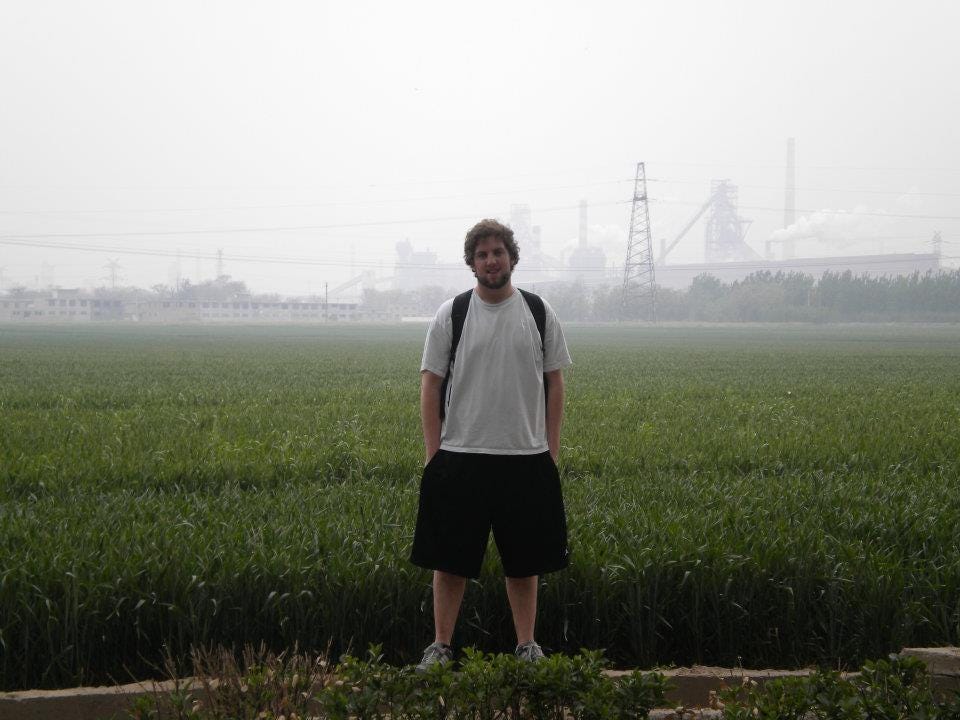
Blog Update from Charlie: Anthony Bourdain said, “Without experimentation, a willingness to ask questions and try new things, we shall surely become static, repetitive, and moribund.” This Substack is my way to publicly ask questions and try new things, so I may demonstrate “the search” and encourage others to undertake it.
But Anthony Bourdain also said, “luck is not a business model,” so I want to remind you that you can support this blog for $8 a month. As of July 2024, I’m recovered from surgery and returning to a regular post cadence, with a novel serialization and expansion into video on the horizon. Your financial support accelerates this work and allows me to reach other people who want to live more psychologically rich lives and be more curious, earnest, and bold.




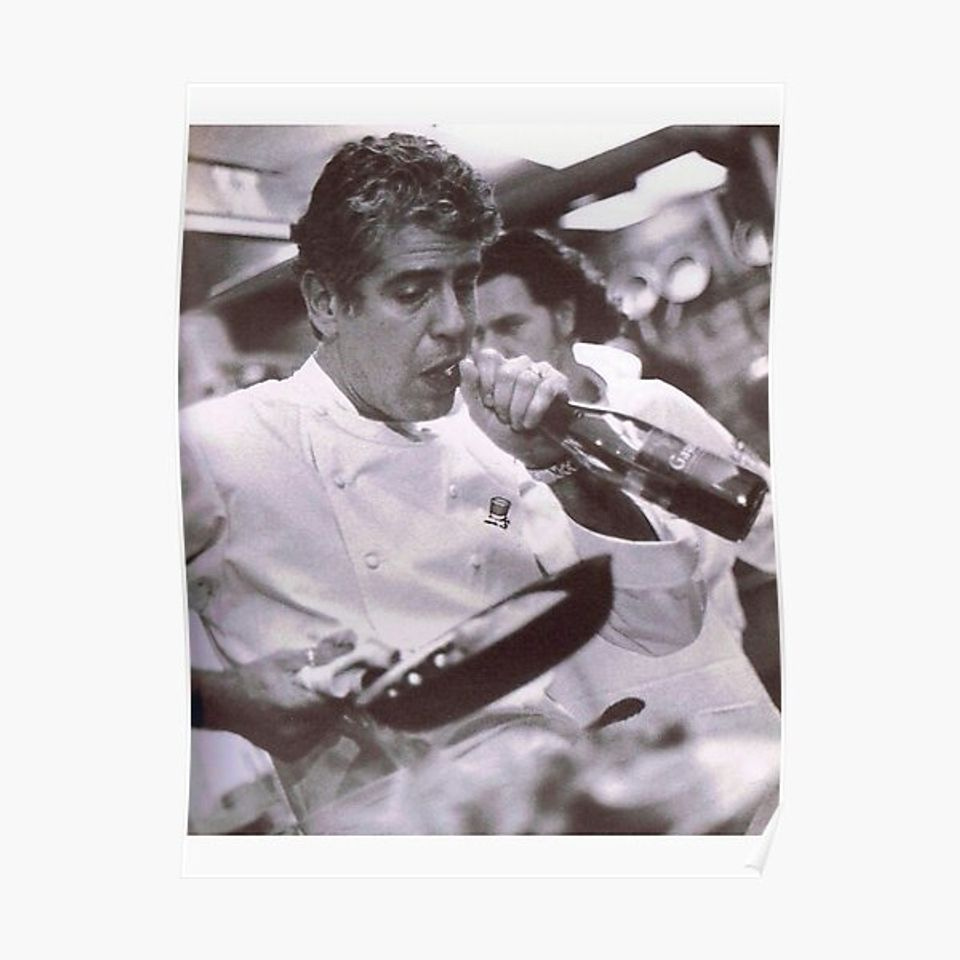
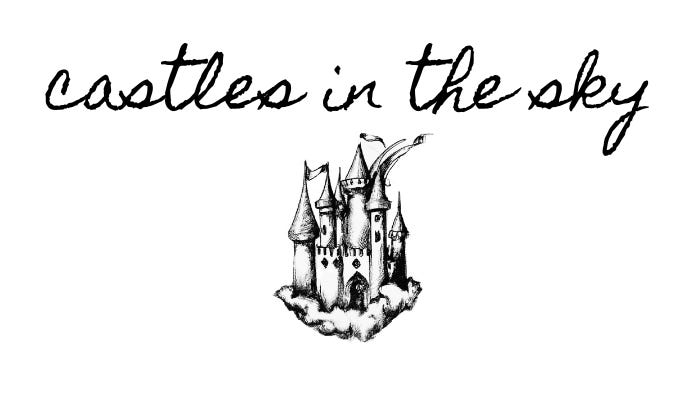
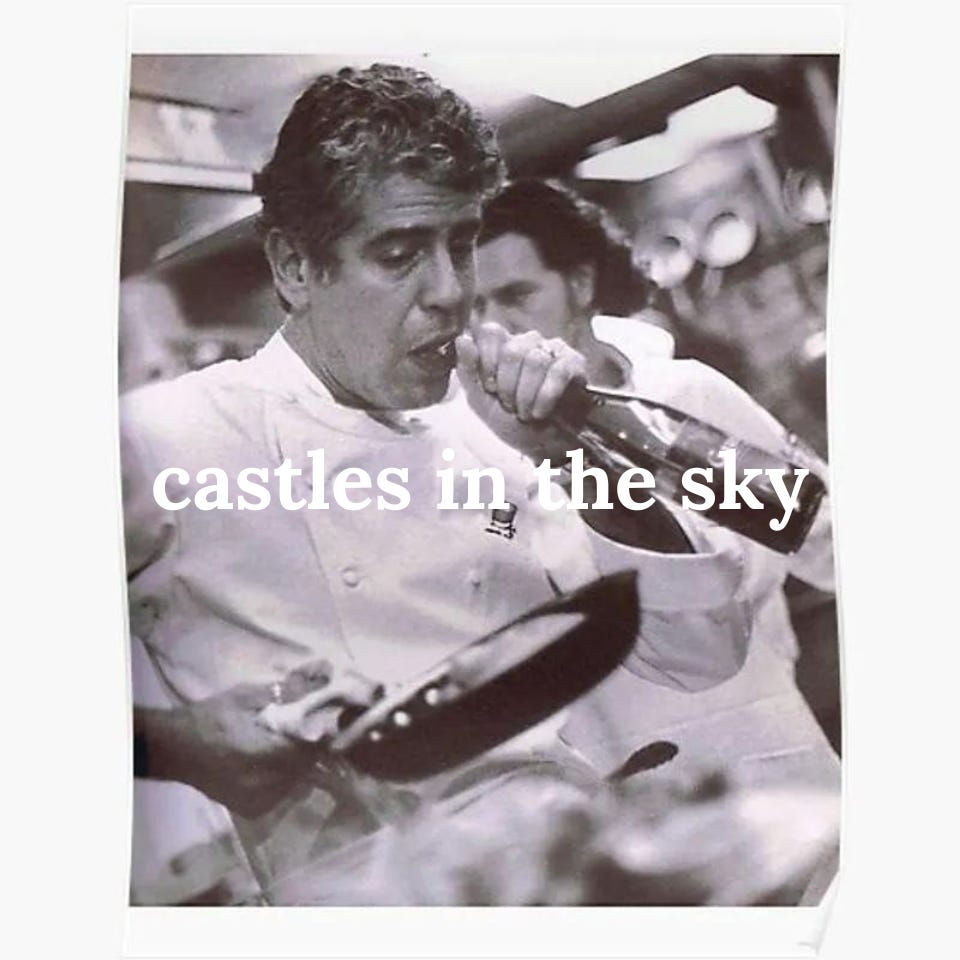





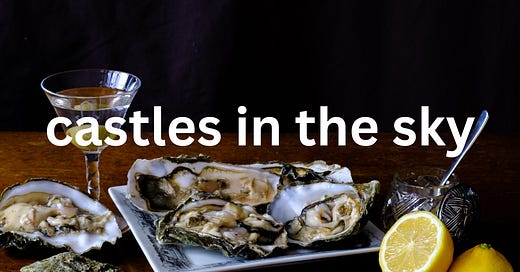

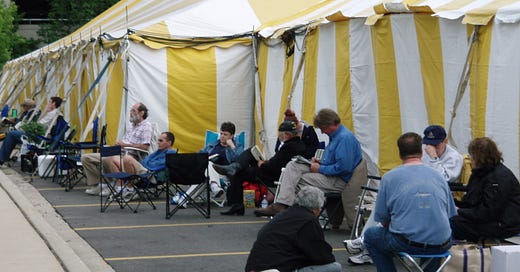

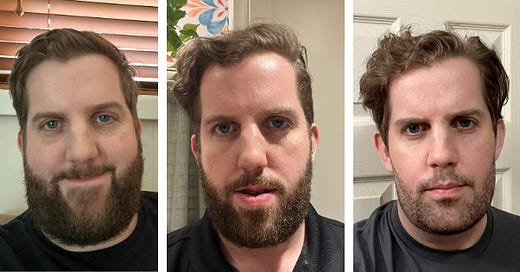

HI WOP FRIENDS WHO MIGHT SEE THIS COMMENT
https://warpcast.com/charliedbecker/0x98a900ce
^ check out me and charlie hanging out on farcaster to discuss his substack
if you are tired of twitter, pls consider hanging out with us on farcaster
Charlie, your authenticity and kindness has always been apparent to me and I suspect that your resonance with Anthony Bourdain was not so much about dreaming of what you could become but discovering what's already true of your character.